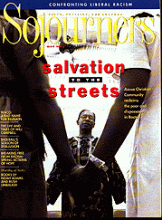The shoot-out and siege in Waco, Texas have raised the issue of religious fanaticism in the mind of America. The subsequent capture of a suspected "Islamic fundamentalist" in the bombing of the World Trade Center and the gunning down of an abortion clinic doctor in Pensacola, Florida, allegedly by a "Christian fundamentalist," have kept it in the center of public attention.
When such violent fanaticism rears its ugly head, a standard response gushes forth from the media and is present, implicitly or explicitly, in most public discussions on the issue. This is the conventional wisdom: It is dangerous to become too religious. The best advice is to stay as "normal" and mainstream as possible.
Religious commitment itself becomes suspect, especially if it is strong and life-defining, moves one away from dominant cultural values, and creates community. The answer to any kind of religious commitment seems to be secularism, or at least religion with huge doses of moderation, allowing us to swallow most of society's secular consensus.
BUT THE PROBLEM with the cultic violence in Texas and Florida, and perhaps New York, is not that it's too religious. On the contrary, these militant fundamentalists are not religious enough. In reality, they are not truly religious at all.
If by "religious" we mean the authentic faith traditions from which the fanatics claim to come, then their religious fidelity can rightly be tested by those traditions.
Read the Full Article

